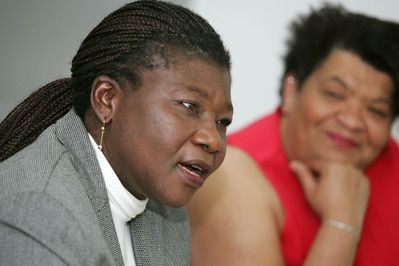
Break the bias: the role of women in today’s trade union movement
It’s true that our movement has many members who look like this, and they are important and valued members. But we are so much more than that.
Trade union membership has grown in recent years, and from the early 2000s, our movement has had more women members than men. The most recent trade union statistical evidence from the Department of Business, Innovation and Enterprise shows that the “proportion of employees who were trade union members was highest for Black or Black British people (26.9%), followed by people who identify as mixed (24.1%) and then white people (24.0%).”
As trade unionists, our Black, Asian and Minority Ethnic members have been true pioneers in dismantling systemic racism and moving workplaces towards anti-racism.
Our Disabled members highlight the ableism that’s present in everyday working life, and teach us how to use the social model of Disability to provide access for everyone.
Trade unions represent workers in nearly every work sector that exists. And yet we’re often painted in such a two-dimensional way that it can be difficult for the general public to understand fully how important trade unionism is to working people.
Joining a trade union isn’t about a membership service that exists when you need it. There’s no doubt that we’ll be there for you, but trade unionism is so much more. We are a movement of people who recognise the unequal power structures that exist. We have a belief system about supporting others in the workplace, in the community and in public life. A belief that working together makes us stronger, and a desire to see social justice and equality.
Saying thank you to women trade unionists on International Women’s Day
On International Women’s Day, we want to highlight the work of our women members, reps, officers and officials and thank you all for the amazing work you do. We know that the pandemic has been particularly tough for women – who are more likely to work in frontline health, care and teaching roles, more likely to catch Covid than men, and more likely to be financially impacted by loss of income and furloughed.
And yet in your droves you have negotiated terms and conditions for workers, helped those escaping domestic abuse, collectively bargained agreements, represented workers, negotiated reasonable adjustments for Disabled workers, and campaigned about topics from the Gender, Race and Disability Pay gaps to the menopause.
Our reps have fought for union members, cried with union members, cared for union members, celebrated with union members and got up the next day and done it all over again.
So, on this International Women’s Day, this is our humble thanks to you, the women of our movement.
We see you, we value you and we respect you. We are grateful to you, and we will always support and work with you to break the biases that exist and make work better for us all.
Today, you can use your trade union values to demand better from companies who are paying lip service to the idea of gender equality whilst failing to support the women in their workforce.
Download our #DemandBetter toolkit today.
It includes a template email which you can use to reply to marketing emails you receive on International Women’s Day, as well as social media posts to encourage others to take action.
